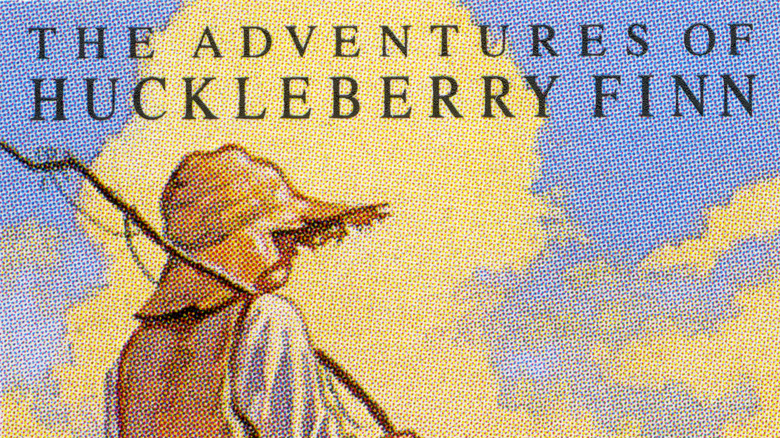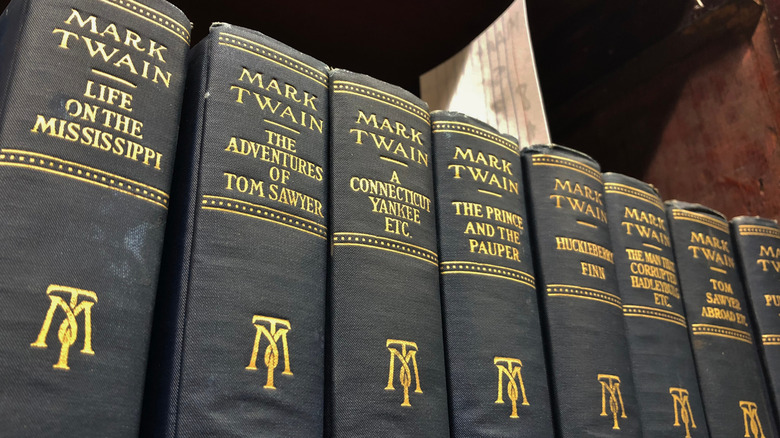Why The Adventures Of Huckleberry Finn Became A Banned Book
We may receive a commission on purchases made from links.
"The Adventures of Huckleberry Finn" by Mark Twain is a beloved work of literature. As a sequel to another classic, "The Adventures of Tom Sawyer," "The Adventures of Huckleberry Finn" follows the challenges encountered by young Huckleberry Finn who, in his journey to escape the hands of his alcoholic and abusive father, joins a runaway slave named Jim (via SparkNotes). The two boys travel the length of the Mississippi River and meet some interesting personalities along the way, per Goodreads.
Did you know that Elijah Wood narrated the audiobook for "The Adventures of Huckleberry Finn"? Did you also know that although loved, the book is not without controversy? Despite it discussing important themes like slavery and freedom, it was criticized almost as soon as it was first published in America in February 1885, per PBS, when librarians in Massachusetts took offense to its dialect. In fact, the book is ranked at No. 14 on the American Library Association's list of top banned and challenged books from the 2000s, just below the "Harry Potter" series.
'The Adventures of Huckleberry Finn' was banned because of its racist terminology
Initial concerns with the book when it was first published had to do with its language, which according to PBS, was deemed "suitable only for the slums." However, over the years, "The Adventures of Huckleberry Finn" became a matter of concern for its liberal use of the N-word (over 200 times to be exact) and its raw portrayal of "antebellum South," according to Politico.
One example of attempts to ban the book include a resolution from 2019, initiated by two state assembly members, asking New Jersey schools to drop the book from their curriculum. The resolution, titled NJ ACR225, noted that the book's "use of a racial slur and its depictions of racist attitudes can cause students to feel upset, marginalized, or humiliated and can create an uncomfortable atmosphere in the classroom." The book was banned once before in New Jersey, when it was briefly taken out of Cherry Hill's syllabus in 1996
These weren't the only times the book was banned from school curriculums for its racist language. A few notable and recent incidents include 2016, when the book was banned from the Montgomery County school syllabus in Pennsylvania, and in 2022, when the book was pulled from the reading program in the Burbank Unified School District in response to concerns raised by parents, per Marshall University.
The evolution of 'The Adventures of Huckleberry Finn' ban
Internationally recognized Mark Twain scholar Jocelyn A. Chadwick thinks that there could be another reason "The Adventures of Huckleberry Finn" is so controversial, according to PBS. Chadwick highlights the evolution of offenses against the book. For example, what started off with crude language that was displeasing to people, eventually came down to the question of how Mark Twain — a white man — could presume to talk about slavery and related issues that didn't have an impact on him. Chadwick, who is a former Harvard Graduate School of Education professor, disagrees with this position. "If you're telling Twain that white men or women cannot write about people of color, are you saying that Black writers should not write about white characters? You can't shut one door without shutting the other," she tells PBS.
Chadwick, who's even authored a book on the topic titled "The Jim Dilemma: Reading Race in the Adventures of Huckleberry Finn," also thinks that with the changing times, the needs of students have altered. Chadwick tells PBS, that children once expressed interest in learning about topics like racism in the 19th century, but today, the interest is more in finding applicability with what they read.
However, Art Hall, a principal of a Pennsylvania high school, says that his decision to ban "The Adventures of Huckleberry Finn" in 2015 had to do with paying attention to the voices of his students, per the Los Angeles Times. Hall wrote of the decision, "We have all come to the conclusion that the community costs of reading this book in 11th grade outweigh the literary benefits."


